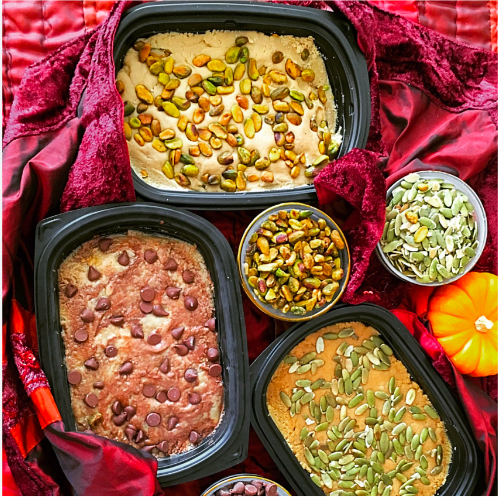Popular Sesame Confection of the Levant Gets a Flavor Twist for Fall

By: Blanche Shaheen/Arab America Contributing Writer
When my mother was a young girl living in Palestine, chocolates and other candies were a luxury. So she ate halawa, (also known as halva) a sweetened sesame seed paste confection that almost has the consistency of chocolate fudge. Halawa means “sweet” in Arabic, and this confection is not only sweet, but packed with calcium, magnesium, fiber, and antioxidants. The word halawa in Arabic means “sweet confection.”
Halawa is prolific all over the Levant, from Palestine and Syria to Jordan and Lebanon. The first written halawa recipe was written in the 13th century in Arabic. This sweet then made quite the trip around the middle east, even to India where they shortened the name to “halva” and flavored it with regional ingredients like dates and coconut.
Store bought halawa often comes with pistachios, but there are also chocolate and even sugar-free varieties. While you can buy halawa in any middle eastern market, you can easily make your own, and the fun part is you can customize the flavors! Buying halawa can be challenging in the States. Sesame can get bitter or even rancid after a while, so finding the freshest halawa is really important. The store-bought varieties can be a bit hard and too sugary as well.
My following recipes yield a softer and less sweet halawa, sweetened with organic maple syrup. Maple syrup is a great replacement for sugar because it is an unprocessed sweetener rich in antioxidants and minerals like zinc, manganese, potassium, iron, and calcium. The more traditional version uses milk powder, and the vegan version uses almond flour. I have included three flavor variations in these recipes: traditional pistachio with a hint of rose water, vegan chocolate hazelnut, and pumpkin spice with pepitas because everyone can use some extra pumpkin spice in their lives this time of year. These make elegant gifts for the holidays, as well as an exotic addition to your dessert table.
To see the easy technique, click on the video below:
Pistachio Halawa
1 cup sesame tahini
1 cup milk powder or use 1 cup almond flour for a vegan version)
½ cup maple syrup
Dash salt
Several drops rose flower water (optional)
¼ cup pistachios
In a bowl, add the 1 cup milk powder or almond flour. Add the tahini, maple syrup, salt, and rose water and stir until it is the consistency of a thick clay. Pat the mixture down in an 8-inch serving dish, or an airtight container if storing for later. Press the pistachios into the halawa before storing or serving.
Chocolate Hazelnut Halva
1 cup tahini paste
1 cup almond flour (not almond meal)
1/2 cup cassava or maple syrup
dash salt
1/4 cup chocolate hazelnut butter
1/4 cup chocolate chips
In a bowl, add 1 cup almond flour. Add the tahini, maple syrup, salt, and stir until it is the consistency of a thick clay. Add the chocolate hazelnut butter and swirl gently but not completely into the tahini mixture for a marbling effect. Pat the mixture down in an 8-inch serving dish, or an airtight container if storing for later. Press the chocolate chips into the halawa before storing or serving.
Pumpkin Spice Halva Ingredients
(Method in Video)
1 cup tahini paste
3/4 cup milk powder
1/2 cup maple syrup
1/3 cup pumpkin butter
dash salt
½ – 1 tsp pumpkin pie spice (depending on how much spice you like)
¼ cup pepitas
In a bowl, add the 1 cup milk powder. Add the tahini, maple syrup, salt, pumpkin butter, and pumpkin pie spice and mix until it is the consistency of a thick clay. Pat the mixture down in an 8-inch serving dish, or an airtight container if storing for later. Press the pepitas into the halawa before storing or serving.
Blanche Shaheen is a journalist, food writer, and host of the cooking show called Feast in the Middle East. She specializes in Arab cuisine of the Levant and beyond. You can check out her cooking video tutorials and cultural commentary on growing up Arab American at https://www.youtube.com/user/blanchetv Her recipes can also be found at: https://feastinthemiddleeast.wordpress.com/


